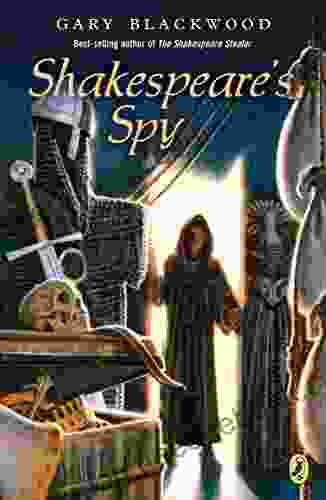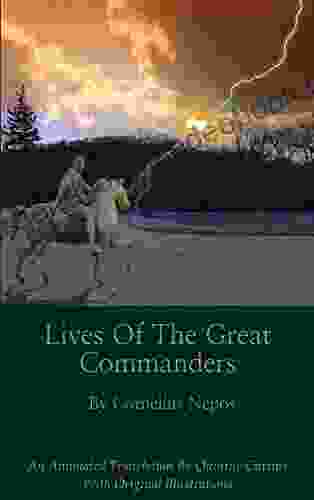Lives of the Great Commanders

4.6 out of 5
| Language | : | English |
| File size | : | 27260 KB |
| Text-to-Speech | : | Enabled |
| Screen Reader | : | Supported |
| Enhanced typesetting | : | Enabled |
| Word Wise | : | Enabled |
| Print length | : | 272 pages |
| Lending | : | Enabled |
Throughout history, there have been countless individuals who have left an indelible mark on the world through their military leadership. From Alexander the Great to Julius Caesar, Napoleon Bonaparte to Genghis Khan, these commanders have shaped the destinies of nations and altered the course of history. Their stories continue to fascinate and inspire us, providing valuable lessons about leadership, strategy, and the human condition.
In this article, we will explore the lives of some of the greatest commanders in history. We will examine their leadership styles, strategies, and the impact they had on their armies and the world. We will also discuss the importance of military history and the lessons that can be learned from the lives of these legendary figures.
The Importance of Military History
Military history is a valuable tool for understanding the past, present, and future. By studying the lives of great commanders, we can learn from their successes and failures, and gain insights into the nature of war and its impact on society. Military history can also help us to develop a better understanding of the human condition and the challenges that leaders face in times of conflict.
There are many different ways to study military history. One can read biographies of great commanders, study military campaigns, or examine the evolution of military technology. Each approach can provide valuable insights into the subject. However, it is important to remember that military history is not simply a collection of facts and dates. It is a complex and multifaceted discipline that requires critical thinking and analysis.
The Great Commanders
There are many great commanders who have been studied by historians and military scholars. Some of the most famous include:
- Alexander the Great (356-323 BC): Alexander was one of the most successful military commanders in history. He conquered a vast empire that stretched from Greece to India. Alexander was a brilliant tactician and strategist, and his army was one of the most powerful in the ancient world.
- Julius Caesar (100-44 BC): Caesar was a Roman general and statesman who played a key role in the fall of the Roman Republic and the rise of the Roman Empire. Caesar was a skilled military leader and politician, and his legions were some of the most disciplined and effective in Roman history.
- Napoleon Bonaparte (1769-1821): Napoleon was a French military leader and emperor who conquered much of Europe. Napoleon was a brilliant strategist and tactician, and his army was one of the most powerful in modern history. However, Napoleon's ambition ultimately led to his downfall.
- Genghis Khan (1162-1227): Genghis Khan was a Mongol leader who founded the Mongol Empire, the largest contiguous empire in history. Genghis Khan was a ruthless military leader, and his armies were feared throughout the world.
- Sun Tzu (544-496 BC): Sun Tzu was a Chinese military strategist who wrote one of the most influential books on military strategy, The Art of War. Sun Tzu's ideas on military strategy have been studied by military leaders for centuries.
- Carl von Clausewitz (1780-1831): Clausewitz was a Prussian general and military theorist who wrote On War, a classic work on military strategy. Clausewitz's ideas on war have had a profound influence on military thinking.
Leadership Styles
The great commanders have all had different leadership styles. Some, like Alexander the Great, were charismatic leaders who inspired their troops to follow them into battle. Others, like Julius Caesar, were more pragmatic leaders who relied on discipline and organization to achieve their goals. Still others, like Napoleon Bonaparte, were ruthless leaders who used fear to control their troops.
There is no one right way to lead. The best leadership style depends on the situation and the troops that the leader is commanding. However, there are some common traits that all great commanders share. These traits include:
- Vision: Great commanders have a clear vision for what they want to achieve. They are able to articulate their goals clearly and inspire others to follow them.
- Decisiveness: Great commanders are able to make quick decisions, even in the midst of chaos. They are not afraid to take risks and make bold moves.
- Courage: Great commanders are not afraid to face danger. They are willing to put themselves in harm's way in order to achieve their goals.
- Integrity: Great commanders are honest and trustworthy. They treat their troops with respect and lead by example.
Strategies
The great commanders have also used different strategies to achieve their goals. Some, like Alexander the Great, used overwhelming force to defeat their enemies. Others, like Julius Caesar, used a combination of diplomacy and military force. Still others, like Napoleon Bonaparte, used deception and maneuver to outwit their opponents.
There is no one right strategy for all situations. The best strategy depends on the enemy, the terrain, and the resources that the commander has available. However, there are some common principles that all great commanders have used in their strategies. These principles include:
- Surprise: Great commanders often try to surprise their enemies by attacking when they least expect it. They may use deception or maneuver to gain an advantage.
- Concentration of force: Great commanders often concentrate their forces in one area in order to overwhelm the enemy. They may use a variety of tactics to achieve this, such as using a pincer movement or a frontal assault.
- Mobility: Great commanders are able to move their troops quickly and efficiently. They may use forced marches or other means to gain an advantage over their opponents.
- Logistics: Great commanders are able to provide their troops with the supplies they need to fight. They may use a variety of methods to achieve this, such as using supply lines or foraging.
Impact
The great commanders have had a profound impact on the world. They have shaped the destinies of nations and altered the course of history. Their victories and defeats have shaped the world we live in today.
The lives of the great commanders are a source of inspiration and learning. They can teach us about leadership, strategy, and the human condition. They can also help us to better understand the world around us.
The lives of the great commanders are a testament to the power of leadership. They show us what is possible when individuals have the vision, courage, and determination to achieve their goals. The stories of these commanders continue to inspire and teach us today, and they provide valuable lessons for leaders in all walks of life.
4.6 out of 5
| Language | : | English |
| File size | : | 27260 KB |
| Text-to-Speech | : | Enabled |
| Screen Reader | : | Supported |
| Enhanced typesetting | : | Enabled |
| Word Wise | : | Enabled |
| Print length | : | 272 pages |
| Lending | : | Enabled |
Do you want to contribute by writing guest posts on this blog?
Please contact us and send us a resume of previous articles that you have written.
 Novel
Novel Page
Page Chapter
Chapter Text
Text Library
Library Magazine
Magazine Newspaper
Newspaper Bookmark
Bookmark Shelf
Shelf Glossary
Glossary Bibliography
Bibliography Synopsis
Synopsis Manuscript
Manuscript Scroll
Scroll Tome
Tome Biography
Biography Memoir
Memoir Encyclopedia
Encyclopedia Thesaurus
Thesaurus Resolution
Resolution Librarian
Librarian Catalog
Catalog Card Catalog
Card Catalog Borrowing
Borrowing Archives
Archives Periodicals
Periodicals Lending
Lending Reserve
Reserve Academic
Academic Reading Room
Reading Room Special Collections
Special Collections Literacy
Literacy Study Group
Study Group Thesis
Thesis Dissertation
Dissertation Storytelling
Storytelling Awards
Awards Reading List
Reading List Book Club
Book Club Textbooks
Textbooks Stuart A Grant
Stuart A Grant Jose Jehuda Garcia Esq
Jose Jehuda Garcia Esq Matt Newton
Matt Newton Luc Sante
Luc Sante Cyan Brown
Cyan Brown David Childs
David Childs Ralph Henry Barbour
Ralph Henry Barbour Patrick Baker
Patrick Baker 2014th Edition Kindle Edition
2014th Edition Kindle Edition Harris M Berger
Harris M Berger Tom O Neill
Tom O Neill Janet Garman
Janet Garman Elwyn Tate
Elwyn Tate Zoran Majstorovic
Zoran Majstorovic Joshua A Braun
Joshua A Braun Adam Bray
Adam Bray Terry Masear
Terry Masear Cary Fagan
Cary Fagan Christina Shelton
Christina Shelton Theresa Howell
Theresa Howell
Light bulbAdvertise smarter! Our strategic ad space ensures maximum exposure. Reserve your spot today!
 Kazuo IshiguroFollow ·16.1k
Kazuo IshiguroFollow ·16.1k Jamal BlairFollow ·10.9k
Jamal BlairFollow ·10.9k Brian BellFollow ·15.2k
Brian BellFollow ·15.2k Glenn HayesFollow ·12.7k
Glenn HayesFollow ·12.7k Albert CamusFollow ·18.9k
Albert CamusFollow ·18.9k Asher BellFollow ·16k
Asher BellFollow ·16k Tom ClancyFollow ·4.7k
Tom ClancyFollow ·4.7k Ken SimmonsFollow ·11.3k
Ken SimmonsFollow ·11.3k

 Keith Cox
Keith CoxFrench Pieces for Flute and Piano: A Journey into...
The world of...

 Justin Bell
Justin BellThe Big Clarinet Songbook: A Musical Treasure for...
The clarinet, with its rich...

 Jamie Blair
Jamie BlairThe Metamorphoses of Ovid: A Masterpiece of...
An Epic Tapestry of Mythology and...

 Alan Turner
Alan TurnerBaa Baa Black Sheep: A Classic Sing-Along Song for Kids
Baa Baa Black Sheep...

 Bradley Dixon
Bradley DixonUnveiling the Enigmatic Shakespeare Spy: The...
Prologue: The Shadowy World...

 Gilbert Cox
Gilbert CoxUnleash Your Creativity with Plastic Craft Lace Projects:...
Plastic craft lace is a...
4.6 out of 5
| Language | : | English |
| File size | : | 27260 KB |
| Text-to-Speech | : | Enabled |
| Screen Reader | : | Supported |
| Enhanced typesetting | : | Enabled |
| Word Wise | : | Enabled |
| Print length | : | 272 pages |
| Lending | : | Enabled |












